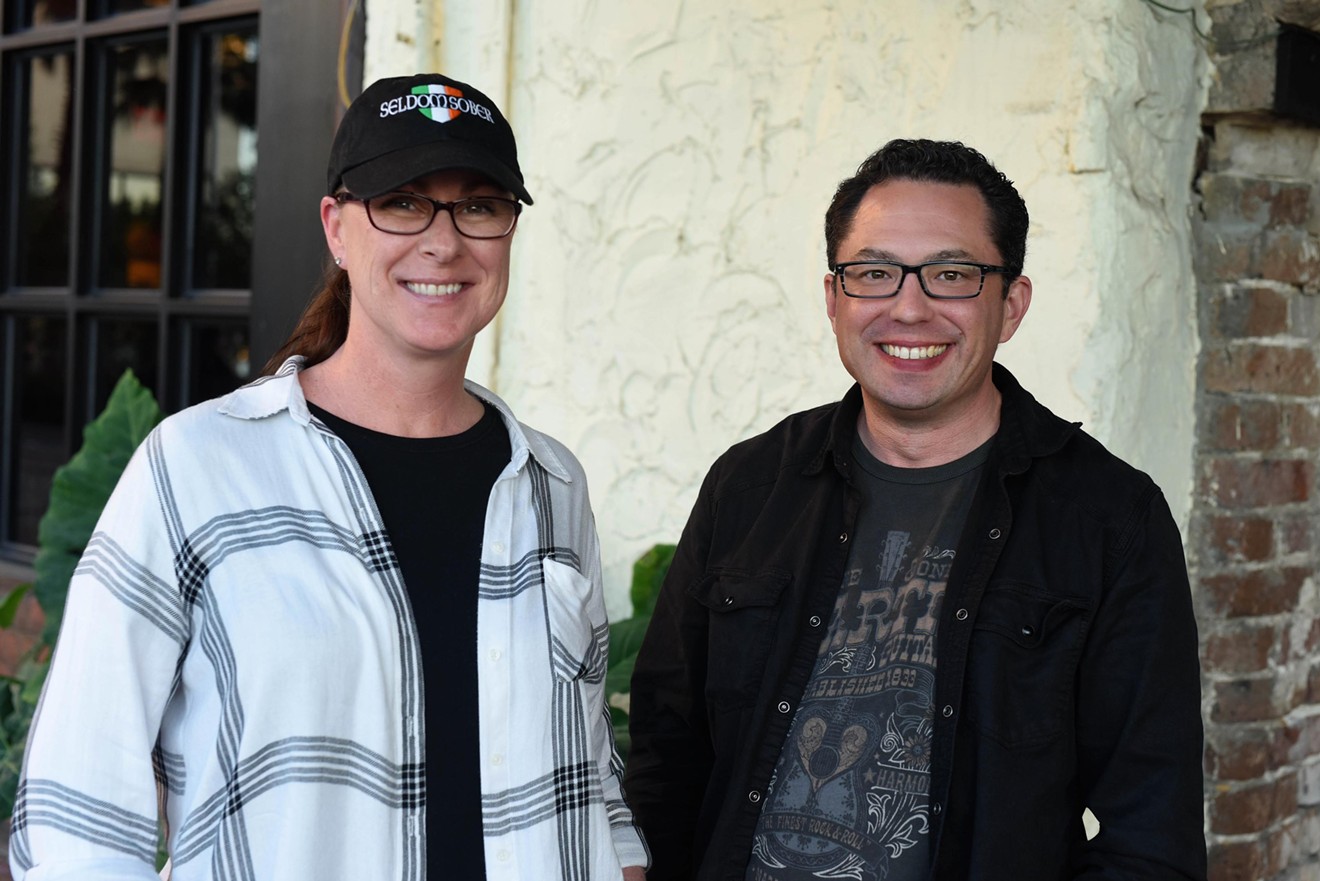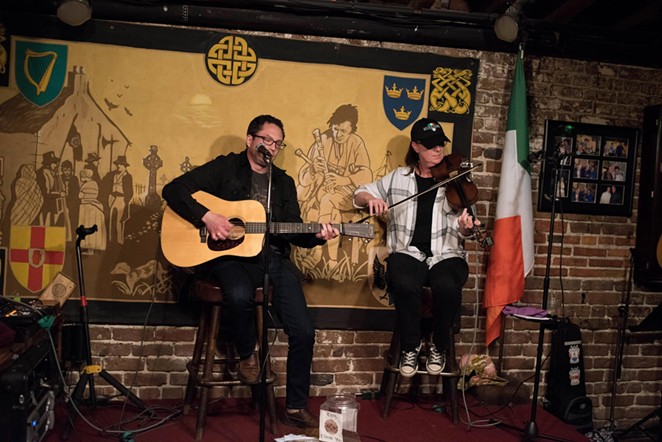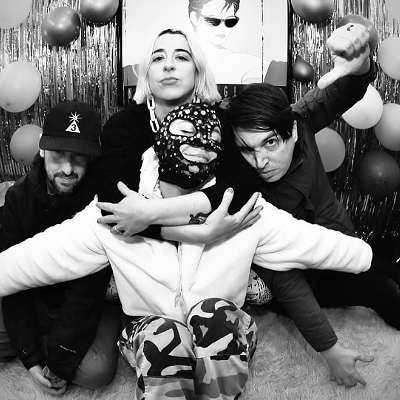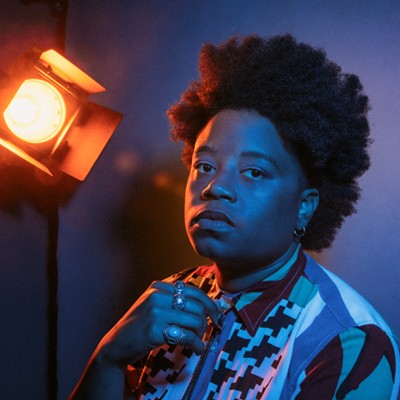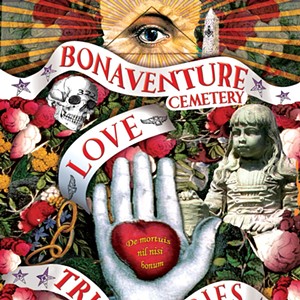Irish culture has long been a feature of the Savannah experience. Most people know we have the second largest St. Patrick’s Day parade while being far from the second largest city to hold one. In the 19th century, a surge of Irish immigrants to the city and surrounding area led to newcomers and their descendants playing key roles in Savannah’s development. Today there are thriving cultural groups like the Irish Heritage Society, the Savannah Gaelic Athletic Association promoting sports, parade organizers, and the Hibernian Society of Savannah. One thing they all do is gather people for a good time, and that means there must be music.
For almost two decades, Irish music act Seldom Sober has been a part of the Savannah Irish cultural and music scene. The duo of Michael Corbett, a Boston native, and Colleen Steele, a New Yorker, have performed at countless shows, events and jam sessions. After a 17-year run, the band is coming to an end.
Connect Savannah caught up with Michael Corbett to discuss his history in Irish music, the Savannah scene, St. Patrick’s Day, and what’s next.
CS: When you were growing up in Boston, was there a moment that stands out that connected you to this music? Some experience that sparked an interest?
MC: Connections locally and in high school got me into Irish music, and then I started listening. I never thought about doing it myself, but then I went to see the Clancy Brothers for the first time in June 1993 and I went to see them again two months later. They were playing the song Finnegan's Wake and I just sat there, and I said, ‘Why can't I do that?’ My parents owed me a high school graduation gift at the time, so I asked for a guitar and some lessons. I learned the instrument specifically to do Irish music and nothing else.
CS: You never played any other style like rock or jazz?
MC: That might be a good thing, right? Like the House of the Rising Sun and stuff like that. But once I learned the basics, I got with my teacher, and he taught me how to play the Irish style. He taught me how to finger pick, he really taught me how to play folk music on the guitar, which is really what I wanted to do the whole time and that's really something that's unique about Colleen and me compared to other Irish musicians in the Southeast. We both learned our instruments and we're trained specifically for Irish music. What you find a lot down here, and I'm not complaining about it because we want as many people in the music as possible, but you have a lot of people who learned other styles first and gravitated towards Irish music. They weren't trained in the actual Irish style.
CS: You were sort of a late bloomer taking up the instrument after high school.
MC: You're right, and that's probably why I mostly play rhythm. I mean, I do some really nice fingerpicking, but not usually in a public show, mostly at home. But no, I'm not one of those guitar players who can strum the chords and pick out a melody at the same time. I developed my rhythm style around Colleen's fiddling style, which is one of the things that made us work so well together. Before I got together with Colleen, I was really a multi-instrumentalist, which meant I played a lot of instruments but wasn't great at any one.
When Colleen and I started playing together, I was more of a banjo player not necessarily because I wanted to be, but because there were already so many other guitar players who were around who got there before I did. When I got together with Colleen, I really had to get good at guitar and so naturally my style evolved around the way she plays and that's not usually how things work out. That's one reason why we sound so good together. I think I developed a style where I could compliment her without being overbearing and letting her melody take center stage. She’s an amazing musician.
CS: How did you end up gravitating to Savannah from Boston?
MC: A lot of it had to do with cost of living. My ex-wife and I couldn't really afford to have a kid if we stayed in Massachusetts and then of course part of it was the weather. We were taking a big risk. I had a decent thing going with an Irish band in Massachusetts and I left it not knowing if anything good would await me down here, but it worked out for the best. Colleen moved the next year, in 2006. I'm sure cost of living factored into it.
CS: What did you know about the scene before coming here? Savannah has always had a reputation for the big St. Patty's Day parade, so you must have known that there was some Irish culture scene here, bigger than you would expect from a city this size.
MC: When we came down to look at it, Danny Doyle was playing. He’s one of the most famous musicians to ever play at Kevin Barry’s, and It was unusual for him to play a small place at that point in his career. I knew this would be a great place for us and I thought I’d never make it up to that stage because it looks like you need an Irish passport to play.
Fast forward to today and some of the most memorable shows of my career were on the Kevin Barry’s stage. It all worked out, but I certainly didn't feel like I was guaranteed to fall in with some kind of Irish band, but I thought at least there was a chance.
CS: So you got here and started sitting in on jam sessions. How did you meet up with Colleen to form Seldom Sober?
MC: I fell in with some of the local musicians playing sessions, where you play in a pub informally not for any money, but maybe for free drinks. I started playing with them and I was somewhat engaged with it, but I was the low man on the totem pole being so new. Then Colleen moved to town and started playing with the session groups. We were playing a session at Murphy’s Law Pub on Congress Street, where Boomy’s is now, and the owner approached me and wanted me to do regular paid gigs there. I immediately went to Colleen and asked her if she'd play with me, and she immediately said yes. That's when Seldom Sober was born, and that's when we got to know each other's material and started working on our own music. It all started out in that little Irish pub.
CS: Kevin Barry’s eventually became a place where you and other musicians would gather and hold sessions. Since it closed, where did the jam sessions continue?
MC: We had weekly, informal Irish sessions with other local musicians at Kevin Barry’s. We just played for free drinks, and it was a great way to learn new material and keep sharp and play for people. That went away. We were never able to bring that back.
Our new home has been Debellation Brewing Company in Richmond Hill. It's a Viking-themed brewery and the owner used to own an Irish pub. He hired us and we can play there whenever we want. It's what keeps us sharp all through the year and then we pepper it with some seasonal gigs around February and March and the occasional wedding and events like that, but it's not the same.
The stage shows at Kevin Barry’s were so different from anything we've ever done because it was a listening room. People are expected to listen, and we had this interaction back and forth with the audience. Sometimes they made us laugh more than we made them laugh. You know that there's no venue like that that I know of anywhere and you know playing at the brewery is not quite the same thing because it's not a listening room, a lot of the people are not paying attention, but it's a great place to play and it keeps us sharp. If we can’t have Kevin Barry’s, at least we have something.
CS: Is there a specific reason Seldom Sober is coming to an end?
MC: Well, Colleen's had some health problems. But I think it really comes down to, you know, post-Kevin Barry’s. We don't have as many of the kinds of gigs that are really enjoyable and as we age, the three-hour pub gigs take a big toll on our body. We didn't mind that at Kevin Barry’s. We'd play a four-hour gig on a Sunday night and have to go to work on Monday because we got so much energy back from the audience and it was such a thrill that you know, you just didn't mind it as much. But then next thing you know, you're five years older and you're not getting that kind of energy back from an audience and it takes a toll on your back and on your shoulders and everything like that.
I'm continuing. I've got someone else that I've been playing with for a long time, and I don't know exactly what we're going to do except play at the brewery, but I’ll be continuing. Colleen is definitely done after April 19. She might play sessions when they come up, but she's not going to perform professionally anymore.
CS: Does any particular time playing on St. Patrick’s Day stand out as extra memorable?
MC: Most of our St. Patrick’s Days involved playing Kevin Barry’s and that was a real trip. In our heyday, we’d play from 2pm to 2am. I don’t know how we got through that. One time we were playing at the airport at 9am the next morning!
But I always felt like Bruce Springsteen playing St. Patrick’s Day. You’d have the most dedicated of the locals and all these northerners and tourists who just eat up Irish music and they know lots about it. They were so enthusiastic, and they are yelling and screaming and cheering and I remember times where Kevin Barry's would have three acts there at the same time. You'd have one act playing downstairs, one act playing upstairs and one act relaxing in the musician’s apartment taking a break.
I remember coming off the stage and then checking back in and having the waitresses come and say, ‘you guys got to get back on the stage, everybody's asking for you.’ It feels good, you know, that's not a normal day in the life of Seldom Sober in Savannah. So it just felt great the last time we played Kevin Barry’s when that happened. The people were asking for us. We were done at 8:00, and we asked the owner if we could go back on and play more without getting paid extra. I think we went back on about 8:45 and we got off stage at 11.
CS: Given the band’s name, you obviously have a healthy sense of humor about some aspects of Irish culture, but on a serious note, does playing the music connect you with your identity, assuming you are at least partially Irish.
MC: Oh, yeah. Colleen is 100 percent Irish. She's second generation. I am more Irish than anything, but mostly Irish. I think for both of us, the music connects us with our ancestry and the history. I made a point to formally study the history of Ireland when I was in college so that I would understand what it was that I was singing about, and I really feel a deep connection to that and a deep meaning and when I sing these historical songs about heroes from the 1798 Irish rebellion and write things like that. Because I studied it and I understand what actually happened, it's not just singing a song. We’re conveying history to people whether they're paying attention to it or not, and it's really meaningful, and really our goal. Yeah, we've made some money off it and stuff which is nice, but our whole goal starting out was just to promote Irish culture in Savannah and bring it to the people.
After 17 years and far too many pints, laughs and singalongs to count, Seldom Sober can declare mission accomplished.

